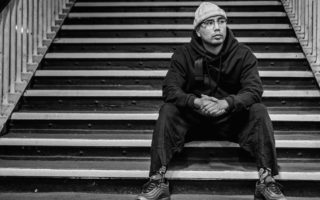
in Food
King Cook
"I found myself becoming a really angry, young chef."

Fighter Michael Olajide Jr was forever changed after a devastating blow cost him his sight. In the following years, Olajide Jr pioneered a system of boxing that reinvented the fitness world. Endorsed by supermodels like Adriana Lima and Doutzen Kroes, his system of boxing-inspired toning and cardio workouts have been credited as the force behind the superhuman bodies that walk fashion’s biggest runways. In an interview with the New York based icon, the fighter talks boxing, adversity, and the mindset of a champion.


Michael Olajide Jr is a fighter forged through the fires of experience. Once the number one contender in the world, his ineffable ease and precision in the ring earned him the mentorship of legendary trainer and coach to Muhammed Ali, Angelo Dundee. "My father called me ‘The Silk’," he recalls, "he saw the way I moved, the way I boxed and went with the flow and said, "you’re like silk". As an amateur fighter, Olajide Jr slugged his way out of his father’s gym and into the hallowed rings of New York's elite arenas. His star was on the sweeping ascent when a single event changed the course of his life forever. In a freak training accident, the young boxer was struck in the eye and rendered partially blind. Once one of New York’s strongest contenders, the promising boxer found himself wavering in the wake of his tragic loss. Years later in a stunning act of recovery, the former winner of the prestigious KE Title has made his name as one of the most elite trainers in the fitness industry. Speaking candidly on his experience, the fighter reflects on his poignant and remarkable career that led him down the passages of reinvention and self discovery.
You can be a great boxer, you can have all the talent in the world. But if you don’t have the focus, precision and coaching of a good trainer, you will lose.
Michael Olajide Jr


Michael Olajide Jr: I turned pro out of necessity. I was born in Liverpool, England but moved to Canada when I was about 8 years old. My father had a boxing gym, and I must have been about 15 years old when I started. For most boxers that would be considered kind of a late start. And it wasn’t the most glamorous of beginnings, but I ascended very quickly to the top. Madison Square Garden had seen a fight of mine and they said, "we’d like to have you become one of our exclusive fighters." So they brought me to New York and I fought Vegas and Salt Lake City. I even fought on TV stations like NBC. I was the number one contender in the world. I’d won the KE title, WBC intercontinental and people were seeing me as the next Cassius Clay. It was a really beautiful experience.
MOJ: I saw so much talent out there that rivaled Ali or Sugar Ray Leonard. These guys had extremely fast hands, they could take a great punch and hit hard. But without the focus of a good trainer they just didn’t succeed. I remember when I first met Angelo. I knew Angelo from his work with Ali and Sugar Ray Leonard. Angelo wasn’t your conventional trainer. He didn’t develop you from scratch, but he would come in to accentuate your strengths. I was fighting a guy on NBC, we were both undefeated. His fighter and I were both 23. My father was in my corner and Angelo was in the other fighter’s corner. His fighter was shorter than me, and as a result, had a lower reach. I had one of the best jabs in boxing, so I was like, "dude, no way this guy’s going to out-jab me". But he was so intelligent. He timed it and told his kid, "every time he throws a jab, I want you to move your head to the left and throw a jab at the same time". This nullified my reach advantage and in fact, it frustrated me because I was getting hit by a shorter guys reach. He was just so brilliant. He understood the nature of the fighter and could recognise his weaknesses only to build them up. He was amazing.
MOJ: A lot of guys have what I call ‘the bomb’. They can punch really hard, but it is a matter of getting that bomb from point A to point B. If you can’t detonate it in the right spot, it doesn’t matter. If you don’t know how to drop it, it does you no good. So that’s like the analogy of boxing. Timing is the most important element in our lives. Fighters like Ali and Leonard and Roy Jones had a great sense of timing. When that bell rang they understood what that meant. They knew what the other fighter was feeling and they understood what they were up against. They had a complete understanding of the moment they were in and what they had to do – when to ride it out and wait, and when to strike. It’s funny because it is the same thing that I had a problem with as a fighter – timing and having that sense for the moment.